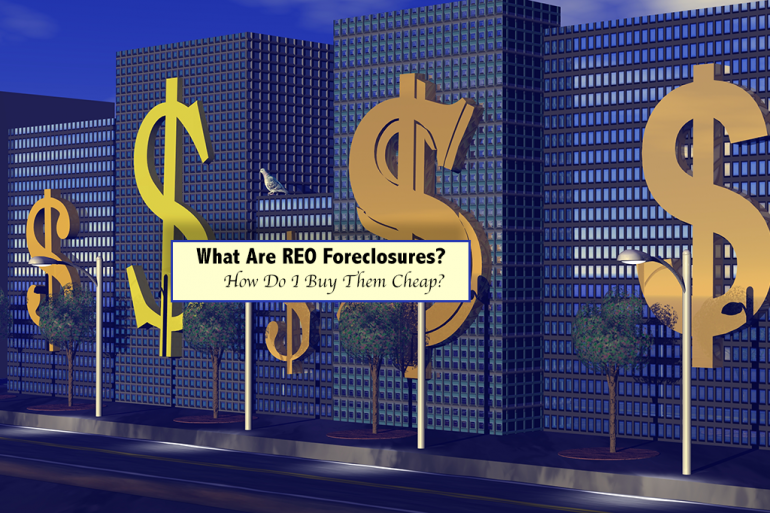What Are REO Foreclosures and How Do I Buy Them Cheap?
If you’ve used PropertyOnion.com to keep track of mortgage foreclosure auctions going on in your area, you may have noticed that occasionally a property doesn’t sell at auction. What happens to those properties after the foreclosure auction?
Do they sit in limbo waiting for a new owner to come along and find them, go to auction again until they find a buyer, or sit in an ever-growing portfolio of properties that the bank holds on to forever as investment properties?
We’re going to break down in detail what happens to these properties, why they are a great opportunity for resourceful investors, and how to find them!
What Happens to Unsold Foreclosure Properties?
The houses that don’t sell at auction go into a state of bank ownership that we refer to as real estate owned. More commonly, you will hear it called REO.
In this situation, the lender on the property is unable to find a purchaser to pay off the outstanding debt on the previous mortgage holder’s note at auction. They are forced to actively pursue selling the property themselves in order to recoup their capital from the property.
Banks are in the lending business, not the business of holding real estate. Their goal is to get the property sold as quickly as possible so they can reallocate those funds to another loan with a paying mortgagee.
Typically, REO properties end up listed for sale with a real estate brokerage just like many other properties that are for sale on the market. They may be listed for full market value, but they are often listed at a steep discount to their market value.
The price is just high enough to cover the previous mortgage holder’s remaining principal in addition to the transaction fees involved with selling the property. These include brokerage fees, which are negotiable but often range anywhere from 4% to 8% on residential properties, depending on the agent and market demand. Closing costs at title companies can be anywhere from 1% to 4% of the gross sales price.
Additionally, lenders must consider any associated marketing fees incurred trying to get the property in front of as many people as possible, whether that be through social media, print media, or even mailers.
Lenders Want REO Properties Gone Fast With Minimal Losses
Most lenders with real estate owned are simply trying to get the property off of their balance sheets as quickly as possible while minimizing their losses. This can become a balancing act, especially if certain periods see an influx of REO properties.
The bank needs to sell these properties quickly so that they can loan the money out to other borrowers who will pay. However, they cannot liquidate the properties in a fire sale. No bank investor will be happy to see the lending institution they invested in reporting losses every month due to failed loans that ended up becoming REO properties.
What is the best strategy for a lender to rid themselves of a growing inventory of homes that they never wanted to own while minimizing potential losses on earnings reports? Maximize visibility on the property as early on in the process as possible and get people through the door to tour it!
REO properties are a great chance for lenders to meet first-time homebuyers and investors in the area and get their contact information for future deals. While many lenders see REOs only as a negative, rockstar loan officers use them as an opportunity. They can help the bank sell the property while building up a book of business and establishing themselves among local investors.
Check if any of the banks in your area with REO properties are hosting open houses themselves. If the open house is being hosted by a real estate agent, see if an in-house lender from the institution will be present.
Something to keep in mind is that lenders are restricted as to how long they can hold real estate on their balance sheets. Federal regulations limit them to a two-year period after foreclosing. If they have not sold the property within this two-year period, they must apply for an exception in order to continue holding the property with the intent to sell it as quickly as possible.
At a maximum, lenders have five years (including extensions to their holding period) to sell the property before the federal government begins levying fines until the property is sold. This is when fire sales happen, but they are very rare. Sometimes banks will hold on to properties intentionally if the market is down and they expect it to swing back up within the near future, but typically not for the entire five-year maximum period.
What’s So Great About REO Properties?
REO properties that do not sell at auction are a fantastic opportunity for resourceful investors. You must be willing to put in slightly more work to track down the property, but you can potentially get a stellar price at acquisition.
As most investors know, a deal can be made or broken at the time of acquisition based simply on the purchase price. Where that purchase price lines up relative to the actual market value of the property can determine how much built-in equity you are getting when you close on the property.
Purchasing at a low-enough price in comparison to the after repair value (ARV) gives you room for a higher profit margin if you plan to update the property and sell it as a flip. Paying too much for the REO property limits what you can do with it profitably, so make sure you are buying it at a discount.
Most REO properties are sold with a free and clear title, giving the investor one less thing to worry about. Additionally, since it is not being auctioned off on the courthouse steps, you will have the ability to tour the property and maybe even get it inspected.
Once a property becomes real estate owned, the bank is highly motivated to get it sold. They are usually quite reasonable with any requests made by buyers to have the property inspected, allow contractors to quote for repairs or updates, and things of that nature.
How Do I Find an REO Property to Buy for My Portfolio?
One way to find REO properties is to keep track of county foreclosure auctions in your area. Use PropertyOnion.com’s foreclosure auction search to keep track of properties that are going up for auction in your target market in Florida. Follow up after the auction date (if you are unable to attend in person) to find out which properties did not end up selling.
You can also get in touch with a local real estate agent and search the multiple listing service (MLS) in your area to find listings that are owned by banks. You can even reach out directly to lenders in your target investment market and request a list of real estate owned properties.
When working with agents on REO properties, it is important that they have experience dealing directly with lenders on these types of deals. Sometimes lenders are not willing to pay real estate commissions, so real estate agents are less inclined to actively search REO properties out. An effective strategy for many investors is making sure your agent knows that they will be paid a fair amount for helping you close on a property, whether it is being paid by the lender or by you.
When reaching out directly to lenders for lists of REO properties in their inventory, confirm that they are all vacant and available for touring. It is not unusual for mortgage holders to cause some damage when they move out before their property is sold at a mortgage foreclosure auction. If they have not moved out by the time it goes to auction and it doesn’t sell at auction, they have more time to vandalize the property prior to vacating.
By ensuring that these properties are vacant and able to be toured, you can get a better idea of whether or not the tenants left it in good condition. Things to look out for include damaged drywall (holes punched, unpatched nail holes, lines across walls indicating wire being stripped and ripped out), broken windows, and even intentional water damage.
Once you know the property is in a condition you can work with, submit an offer and begin implementing the investment strategy of your choosing upon acquisition!
REO Properties Can Be Great Investment Opportunities
By finding a great REO deal, you can save money on acquisition cost and purchase a property with a clean title at a steep discount to market value.
Building good relationships with local lenders and using online tools (such as the ones offered by PropertyOnion.com) to locate them as soon as they become REO properties allows you to begin making offers on these excellent investment opportunities right away.








